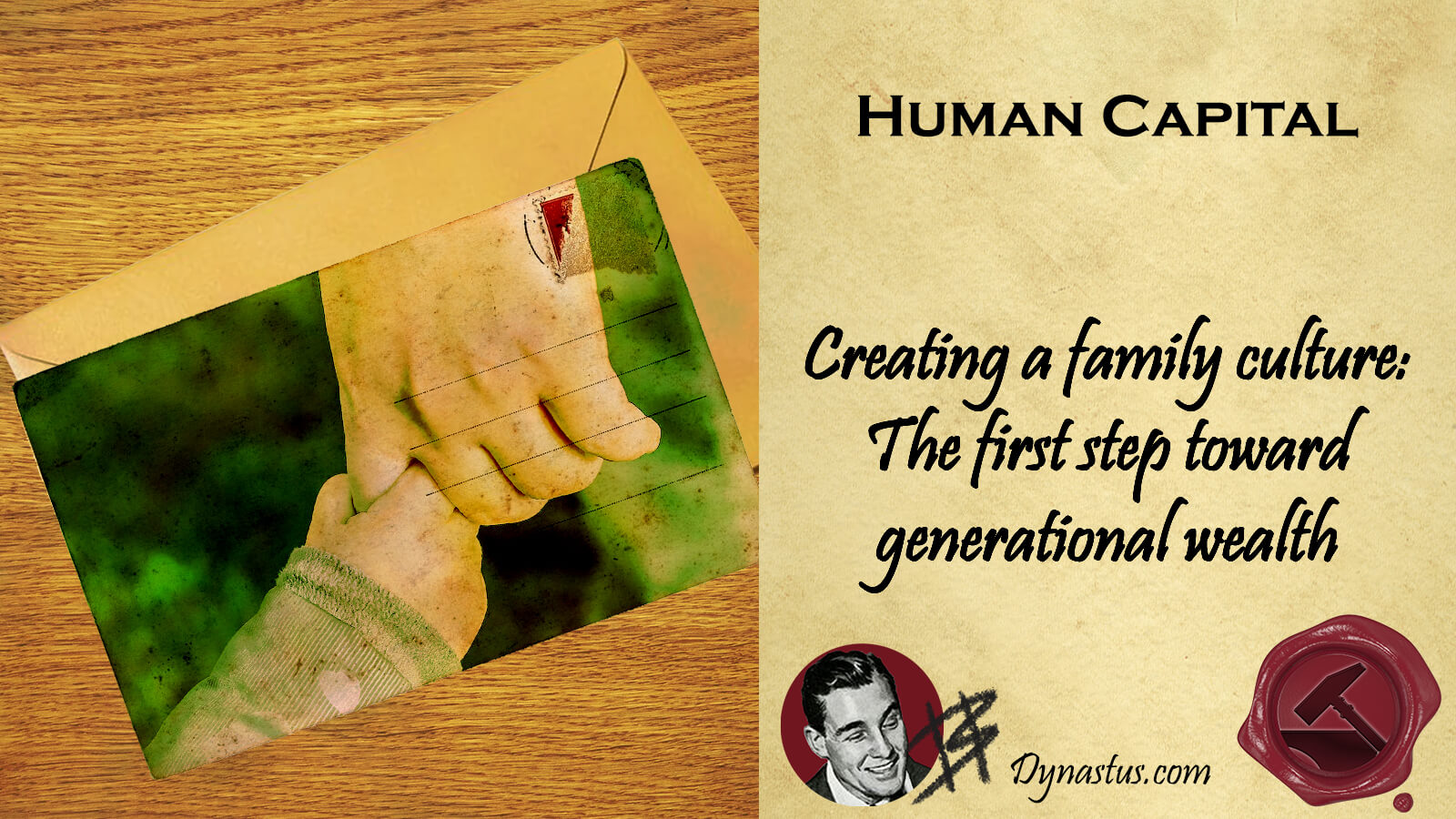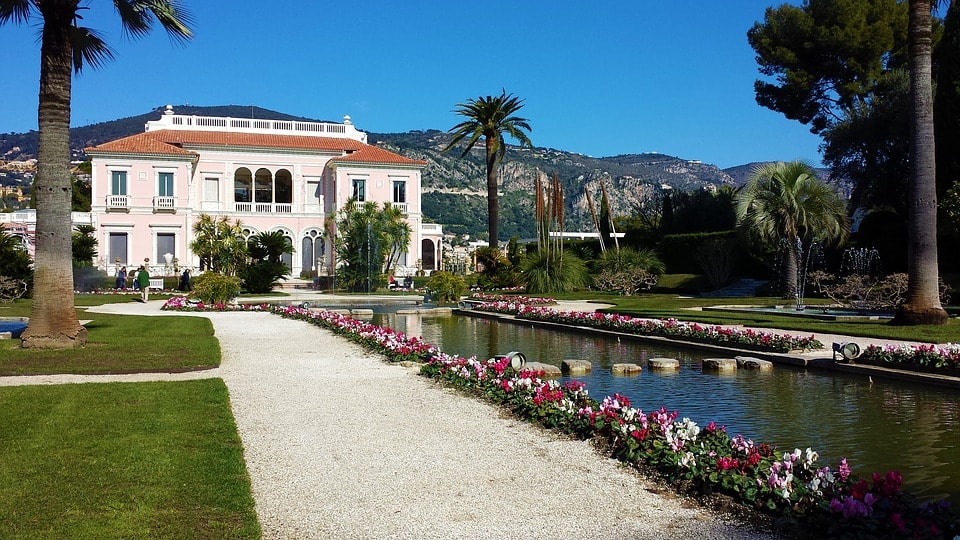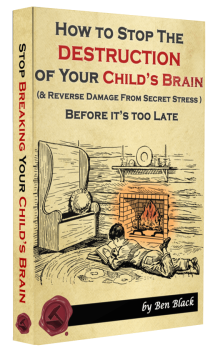
Disclaimer: I am not a financial advisor and this page exists to aid you in your research, but not make or suggest decisions for you. Further research is recommended for you to draw a conclusion of your own. Additionally some links contained on this page may be affiliate links in which Dynastus will receive a portion of sales at no additional expense to you.
There are four core types of capital for creating a dynasty: Human, Intellectual, Social and Financial.
There’s a reason Human capital is at the top of the list. It is the most important. No question.
There is no family without its members. And a family won’t last without the multiple surviving generations, culture, and beliefs to continue it’s legacy and purpose.
But, not only are the members important for a legacy family, all families have members. Human capital is also the connectedness, emotional stability, the family culture, the willingness to participate in what it takes to build intergenerational wealth.
A family needs to have joint ideals and a culture to continue on a legacy and build generational wealth. Without these, families become disjointed and broken apart. Like most modern families, if they don’t have a strong connection to their roots, the culture is lost, and the human capital dilutes.
Who are Family
We aren’t talking about just your direct descendants. We’re talking about their spouses, potentially ex-spouses, adopted children, girlfriends, boyfriends, their children, their children’s children and even people you won’t even meet, your great, great, great grandchildren.
Each of these members has attributes of their own, some are tall, some are short, some are smart others dull, some are athletes, others couch potatoes.
They have talents, drives, desires each of them in all probability is unique in their own way. and this is part of what you need to take stock of as a founding father or founding mother.
Why Fortunes are Lost to The Annals of Time
As mentioned, ALL families have members, but most families don’t have generational wealth – ‘Old Money’. There’s a saying common across all cultures in some form or another. Shirtsleeves to shirtsleeves in three generations.
And there’s a reason for this, most families, most people don’t plan for the ‘long, long term’ nor go into their lives with the intent of creating a dynasty.
And there’s a reason for that too. In the modern day, it requires a conscious effort, and the knowledge has been obscured by mass-media..
Now don’t get me wrong, a lot of people make and keep ‘money’, it’s just handing it over that’s the hard part, really.
In fact, with all the modern tools and vehicles afforded to us in the modern era, there is no excuse not to leave something behind.
A fortune won is a fortune lost but a fortune earned is a fortune kept. To earn a family fortune, a family must learn how to keep it. That takes, first and foremost, human capital.

Shirtsleeves to Shirtsleeves
The shirtsleeves to shirtsleeves in 3 generations adage implies that a fortune earned by one generation is disappeared within 3 descendant generations and has to be re-earned.
This is because the children of these wealth builders lacked the culture, the training, and upbringing to nurture the wealth the family has accumulated – to add to it, grow it and apply it to improve the lives of its members.
If you’re going to build intergenerational wealth you need to make sure your focus first on the people that make up your family And this is probably going to start with your partner and children and then, in time, their children as you become a grandparent.
Say NO! to Outsourced Parenting
Building upon the strengths and mitigating the weaknesses of the members of your family will help improve your human capital. As a founding father or mother, it’s important you learn how to do this in an effective way.
Typically, this will start with being the best possible parent you can be. I recommend reading as many resources on parenting as you feel is right, which in no instance should be none.
The amount of ridicule I have received from reading parenting books ahs told me all I need to know about the effort of the average parent (and their defense of that)
Too often, families that have money, particularly those that put financial capital at the top of the list, employ caregivers to care for their children After all, their time is more efficiently spent earning, and outsourcing your childcare, right?
Well doesn’t it sound stupid when I word it like that? “Outsourcing the raising of YOUR children.” The caregivers can come and go, and trust me, as much as they may like your kids, they don’t care about your family and your legacy as much as you do (or should).
So who parents then?
For years – centuries – even millennia, children were raised by a parent(usually the mother), and often times close friends and family too. And this led to children that grew to be much more emotionally stable as there is a sense of permanence rather than transience in their lives.
I know, I know, its hard on a single income these days, to get by to provide for a family, I understand that. But this is a long term investment, and like everything else you should do, you’re delaying gratification for a huge payoff.
This may mean living in a smaller house, growing more of your own food, it may mean you can’t have that sports car or you have to shop second hand, but the bond you get to form with your children is impossible to put a dollar figure on.
Having one parent focused on the household also has the added benefit of allowing the other to focus in on wealth creation. But more about the dual-income treadmill in another post.
In all, children that have been raised in a stable household tend to become more stable human beings.
Don’t Forget Grandma!
If you’re in the second or 3rd generation of your legacy family, then grandparents can also take a ride in the parenting seat. The key thing here is that they’re already integrated with the family culture.
Remember you can’t carry a new culture back a generation, and grandparents don’t share the generational wealth mindset as the one the parents of the grandchild want to instill, then there can be contention.
This is because for the generation before the founding parents of a dynasty to change, is to also admit they have done wrong. The only people that can accept they can do things better are those willing to change, and most people are not willing to. If you’re trying to start a dynasty, you’re the first generation, and it only goes to your descendants from here.
Tread lightly, is all I’m saying really. You don’t want to be the grandma that gives your grandkids candy when their parents don’t want this to happen. Nor do you want to tell them things the parents would rather you not.
Resources
Here are a couple of resources I recommend reading to fine tune your parenting:
These two were by far the best resource I found in getting a greater understanding on parenting young children, without any fluff.
Family Culture
Human capital lies in the history, culture, and traditions of your family as well. For example, Sunday pancakes are a good way for families to share stories and get together on a morning where a lot of people go out to shop. Maybe you make Sunday mornings your project time, where your family all go out and work in the garden together.
The traditions you keep on holidays matter as well. How Christmas day is spent(or the days leading up to and after), or how you celebrate birthdays will all play a role in the upbringing of your family when young and into the future.
There are also rites of passage. Something that is often forgotten in western cultures. These are cultural traditions that mark transitional periods in our lives. Whether this is the transition to parenthood, an acknowledgment of a transition to adolescences (called social puberty) or a specific marriage ceremony.
Rites of passage give anchor points and solid traditions to mark important transitions in our lives that help keep our many family members tied together.

Connectedness
Families need to be cooperative and connected. And this in and of itself is no easy feat. People grow apart, it’s just a natural thing with time. But a legacy family grows closer as times goes on, and this is intentional.
The Walton’s, as in the descendants of the founder of Wal-Mart, get together every year to catch up with each other. They also discuss business affairs, but they mostly just spend time with one another. keep in mind this is a family that consists of over 100 members, all of which are tied up in the Old Money they possess as a family unit.
It will be up to you as a founding parent to create these traditions to build connectedness in your family as well. These traditions should last well after you’re gone and will be cemented in your family culture.
Education
Education is another important factor in human capital, which will add to intellectual capital as well. But education in the human capital sense is more on the curiosity side and knowing when and where to find the information required for self-development in both competency and creativity.
There are two types of intelligence, crystallized – known, solidified facts and fluid, the ability to combine information and concepts together in new and interesting ways. Human capital incorporates both of these.
It seems simple to just send your child off to school or college and claim they’re getting educated, but how well did that work for you or most anybody else you know? It most likely didn’t result in huge wealth building, while installing the knowledge to create a dynasty, and more than likely didn’t give you the results you want out of your life.
Traditional or Curiosity?
Despite what a lot of other sources say, traditional education is NOT a waste of time. It is crystallized intelligence and will add to your family’s intellectual resources. It isn’t always going to suit everybody for every path, but it is important for most normal people.
The kind of education we’re talking about for human capital is curiosity. Members of a legacy family are lifelong learners, they have to desire to learn and seek out knowledge in a methodical and logical fashion. If they don’t understand something, they will first draw upon the intellectual capital of the family.
“Mum, why is the sky blue?” “Dad, how come birds can fly, but cats cant?” “Uncle Jim, how does a plane fly if it’s so heavy?”
Once this is exhausted and as they grow older, they may turn to social capital, asking teachers, family friends, and advisers complex questions to further their understanding of the natural and social world.
They will also, most likely turn to other resources to learn, much like you are…reading this sentence…right now.
Homeschool
I am a big advocate for homeschooling. The public school system was designed to create workers for the system, not leaders to run it.
People’s first kneejerk reaction to homeschooling is ‘socialization’. Which is absolutely false. If anything, school inhibits socialization. These same people will turn around and complain about bullying, and have tender memories of their own school experiences.
Separation from family and isolation to age groups has many negative impacts, but two are most notable:
Children become more peer dependent, spending more time in their day exposed to children of the same age. This strips individuality as a desire to conform takes hold, and replaces important character and cultural building by parental and familial admiration.
Maturity slows in children who attend age-grouped schools, as they are not learning to become adults form other adults, but from teachers who can give minimal attention, and other peers.
Active, high-effort homeschooling is optimal, learning to socialize like an adult would will build stronger social skills, as well as the ability to interact with the adult world sooner, rather than the passive efforts found in a public schooling environment.
By actively participating in your child’s education, you can create tailored programs to suit their interests and capabilities perfectly, giving them far more attention than they would other wise receive in a school.
By joining a homeschooling group, and enrolling your children in local clubs, the social aspect will be more than fulfilled for your children, without the sacrifice of long term family bonds.
Homeschooling also helps siblings for tighter connections though aiding in the education process and spending more time together – vital for the strong connections found in a dynasty.
By the second generation, homeschooling can be a shared responsibility for uncles and aunties, making it even more manageable as a whole,. and giving greater access to a wide range of knowledge and skills.
Catering for Curiosity
Nurturing this hunger for education is a part of the family supporting one another. Finding what younger(and sometimes older!) members are curious about, what their passions are and encouraging them will do wonders for confidence and for growing curiosity.
Parents should help their children answer the many questions they have. After all, the school system quells curiosity in most people by the age of 12. ‘School’ teaches people to answer questions, not ask them.
Education also entails personal development. Through learning how to be the best people we can be a family stands a greater chance of building a dynasty. This is the hardest education of all, as personal change takes commitment, hard work, and sacrifice beyond what most people are willing to give.
Happiness
The happiness of your members will largely contribute to the long term outcome of your family too. A family filled with contempt and disdain will never last.
Instead, your human capital needs to be filled with happiness which is the hardest thing to foster in family members because it’s just so subjective.
I can’t really tell you how to find happiness for yourself and every one of your members because of this subjectivity. (nobody can)
Flipside
There’s the flip side of happiness to watch out for too, the liabilities to the assets if you will. These come in the form of behavioral issues, medical problems, mental health, disabilities, and substance abuse.
A strong family will band together to help and resolve these where they can, and support members when and where things can’t be resolved.
These issues left unchecked only roll into bigger problems. A depressed family member that doesn’t have the support they need to manage this crippling condition will self destruct, a person with substance abuse issues will probably do the same, and potentially take others down with them.
Only with enough well-developed people with plenty of optimism and realism, will a family can survive to become a dynasty.
There is no judgment within a family, each member should feel free to discuss issues and ask for help from their flesh and blood. This is key to a legacy family.
Support network
Building human capital has huge advantages. It creates a permanent support network, it means a family is not only relatives but friends as well. It creates stability in the lives of the constituent members and the peripheral and additions to the family as well.
The Family Sanctuary
In ‘Americanized’ cultures, children move out of the home as soon as possible, and the parents can’t wait for this, as they can finally be happy, all alone again as they once were before children. Seems…kind of sad.
In most other cultures, children live with their parents well into their adult life. And this comes with huge advantages.

A Rothschild Sanctuary.
A large family house, supported by 2 or even 3 generations reduces housing requirements. This in turn reduces expenses which can be rolled into investment, business, education, and personal development. A family house creates a sense of togetherness too, with shared meals, workloads and a place to feel safe and supported by fellow family members.
When a family outgrows a single house, they can also look at a larger Family Sanctuary or Dynastic land. A compound, where the family lives, and shares resources. The entire family doesn’t have to live here of course. The Family Sanctuary is the place one thinks of when they think of home. It is a safe and secure place of acceptance and refuge. They come in many forms, which you can read in my post on the family sanctuary.
And when a family member wants to move, they could move into one of the family properties(paying a below-market rent – no free rides!), and return home to the sanctuary again if they ever want or need to. This is an aspect of a method of family wealth generation called the collective.
Human Capital
It is all of the above that makes your family uniquely yours. And this uniqueness and where the people that make up your family fit into it that makes human capital the most important capital for your generational wealth family.
There is no family without its members. Understanding and building the connectedness of these members is where the core of a family’s strength lies.
What strengths do you hope to build on in your family? Let me know in the comments below.
Thanks for reading.
Yours,
Ben Black






